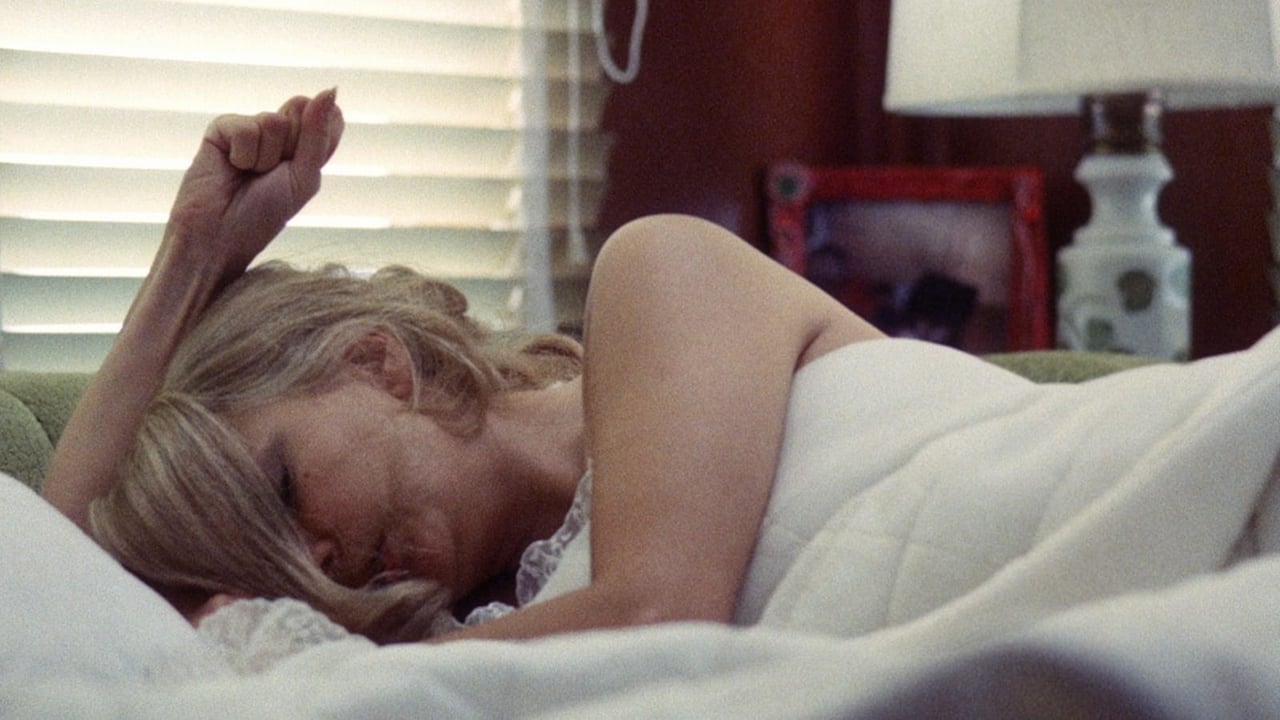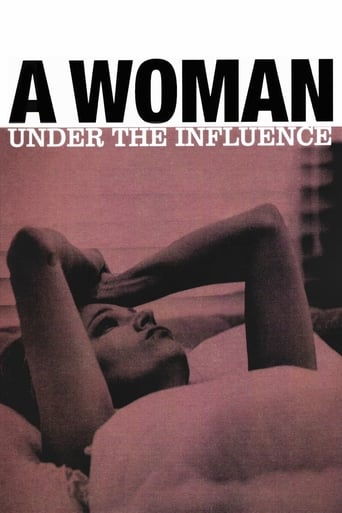

The greatest movie ever made..!
... View MoreVery interesting film. Was caught on the premise when seeing the trailer but unsure as to what the outcome would be for the showing. As it turns out, it was a very good film.
... View MoreI wanted to like it more than I actually did... But much of the humor totally escaped me and I walked out only mildly impressed.
... View MoreAll of these films share one commonality, that being a kind of emotional center that humanizes a cast of monsters.
... View MoreI watched this because it was on a best movies on Netflix. I was really surprised by how engrossing this movie was. The acting was fantastic.It is a look into a family's life torn apart because the mom/wife is suffering from ... insanity... manic depression? Something... and a husbands desperation to keep it/himself/the family together. You really feel like you are in the movie with these people and at times it makes for very akward watching. Spoiler but not really - there is a scene where there are a whole bunch of guests eating dinner at the main character's house and the woman is getting a little to weird for the husband and he yells at her to sit the hell down and there is dead silence and akward shifting in chairs. Ugh it made me feel so uncomfortable I couldn't stop watching!!!
... View MoreAround half its time, this movie is as pleasant and entertaining as watching an unedited tape from a psychiatric ward. Gena Rowlands does deliver a very good performance and Peter Falk also does a good job. But what about the rest that constitutes as a movie?Yelling, yelling, yelling. And some more yelling plus slapping in the face. Little to no action. For 15 minutes we are forced to watch actors eating a meal. That's right, that is what that scene near the beginning is all about: the cast is just eating, cameras rolling, script not existing. It is just an improvisation with a little editing done afterwards, with totally boring end effect. And something similar is repeated at the end: they are just cleaning the table for four minutes. How fascinating and mind openingThere is almost no musical score; which is always a risky move, because it makes the movie more realistic but at the cost of being less appealing to the audience. So on the one hand, we have a "realism of no music". But on the other, we have a scene with a rope at the dig site: one of the characters (while being angry) manipulates (probably without bad intentions) the rope, while other character uses it at the same time to go down a slippery hill; and falls down. At there are two problem with this event. The first one: there would be no way to manipulate the rope with such ease (especially with one hand), because of the weight of that (fallen) character. The second one: the issue of perpetrating the accident is later on never addressed by authorities or even the rest of the work crew. So that is quite unrealistic roll of events. And so, a mixture like that just makes you think of the whole movie as a chaotic endeavor; a movie with modus operandi of "My name is John Famous-Actor-Slash-Independent-Director Cassavetes and I am taking a serious subject of mental illness, but I do not care about the rest, because I have already used up seriousness on being an self funded independent director". And on the technical side of this picture there are problems with bad lighting and bigger problems with even worst soundThis movie is so boring and hard to digest, that unless you are a film (or medicine) student, you should not approach it
... View MoreFresh to Cassavetes' canon, A WOMAN UNDER THE INFLUENCE is tiresome and exhausting for my first-time viewing, throughout the entire running time (155 minutes), we watch a series of intense clashes between Mabel (Gena Rowlands) and Nick (Peter Falk), sometimes catalyzed by their family members or close friends, and the repercussions includes Mabel exacerbates her mental disability and the collateral damage to their 3 young children. Using intimate and irregular camera-work to demonstrate a fly-on-the-wall authenticity opens a maximum door for thespians to show off their superlative working-class liberation of feelings and emotion, Gena Rowlands, immerses into her character with optimum dexterity, from her quirks of sputtering and word-mouthing, the fervid and persistent advocacy of opera aria to the time-bomb of her squeamish frailty, we never know when will she explode, whilst time is ticking and the wait is taxing both for the players and the spectators. She also shines in her warmer facet during the heartwarming episodes with her kids. Mabel is a dream role any actress would be ever craving for, Rowlands is the performer nonpareil for her concentrated and committed dedication of embodiment without falling into the pitfall of borderline OTT. Falk, a flawless pick for an ordinary blue-collar, bedeviled by his wife's unhinged nature and stumped by the futile and consuming communication, improperly catches the worst moment to throw a surprise party for Mabel, his quandary could be easier to be related by the audiences, besides, his trademark out-of-focus eyes betray his frustration and it is certainly the situation is at his wits' end. This tiny budgeted film is a family workshop, kinfolks and friends constitutes the cast, e.g. both Cassavete's mother Katherine and Rowlands' mother Lady plays the in-laws in the film. Overall the film is a challenging project which unflinchingly debunks the underbelly of the marital bond, "till death us do apart" is so harrowing to listen under this circumstance. During the conjugal tug-of-war, Cassavetes pluckily interposes their children into the game, at the eleventh hour, it is the kids' relentless endeavor thaws the edginess induced by the heavy volley of laborious squabbles. Finally I must bellyache about the befuddling time-line, when Mabel brings a stranger to her house at night, it is the next morning Nick and his workmates come back from working, they have an unpleasant midday dinner, then it is the morning after Mabel's mother brings the children to home before school, right? Then how come later Nick's mother accusing Mabel for adultery at "last night"? Help me out here, it does bugs me, otherwise it is an indeed unique film of its own kind, although it doesn't gratify my satisfaction thanks to the frivolous and dreary altercations, I am always coveting for a bit more from the story plainly extracted from the lifelike experience, other than accentuates the tedious and irksome sensory overkill, it would be nicer if a sensible approach could lead us to a palliative nostrum to set our cerebral phase back to a normal state.
... View MoreI really wanted to love this. I think that John Cassavetes uses a powerful aesthetic technique that gives the film a very authentic atmosphere throughout. A lot of the time it felt more like we were just living with these people then like we were watching actors reading written dialogue. Almost improvised in a lot of ways, or I'd even go as far to say like a home movie. Peter Falk delivers a tremendous performance as the husband of Gena Rowlands' mentally unstable Mabel. Cassavetes constructs the whole thing as a study on the role of madness in the American family, how it buries in and makes an impact on the entire household.Rather than strictly making it a study of the psychotic Mabel, he makes an intimate point in exploring Falk's Nick, the loving and eternally trying husband. In Falk you can feel that peculiar blend of resentment and adoration towards Mabel, constantly lashing out at her mistakes but eventually coming back down out of the everlasting love he feels towards her. This is where the work by Cassavetes shines the most, in exploring that strange balance that occurs with this kind of love, with this kind of person being in a marriage. The film is deeply uncomfortable at times, which I mean as a huge compliment, when we see strangers and even friends gathered around witnessing Mabel's madness and being completely unsure of how to react. I think a lot of scenes go on too long and there's no reason for this to be over two hours, but the eerie sensation Cassavetes is able to bring out of these extended interactions was very interesting to me.Where the film doesn't work for me and what dragged it down a lot, unfortunately, was in Rowlands' performance. I wanted so badly to adore her, but she was so inconsistent. Her more reserved moments are brilliant, an unsettling picture of a happy woman with a madness lurking within her, but it's her more manic displays where she totally lost me. In all of her ticks and eccentric behavior, Rowlands felt so calculated, none of it coming off naturally or with any sense of believability. It was honestly hard to watch at times, not in the good way, seeing a film with such an approach of authenticity be dragged down by a performance that was absolutely anything but. It all leveled out somewhere around the middle for me, able to greatly admire the work of Falk and Cassavetes but deeply disappointed by Rowlands.
... View More